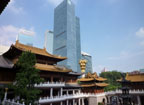Could a Buddhist temple, established at the time of the Three Kingdoms (247 AD), be standing and thriving in the center of  Shanghai today?
Shanghai today?
To seek the answer one needs to pass through West Nanjing Road, the old British Concession, to see the gold pillars and tilting roof corners in the midst of a forest of the glass-front sky scrapers. The Temple Jing An 靜安, meaning serene comfort, has a name that tells its lasting and respected presence in China’s most flamboyant metropolis, nick-named, once upon a time, ‘The Paradise of Daring Explorers’.
Comes Lunar New Year’s Day, the streets in the surrounding blocks are closed from traffic, so as to house the ever enlarging pilgrimage crowd. Everyone fights hard to get in the temple, to express his/her wishes to Buddha and Guan Yin 觀音. Most people are practical. They just accept the fact that getting in is impossible. They simply light their incense sticks and candles, and kneels to pray on the spot, facing the temple. It is all for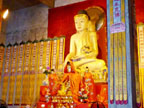 asking Buddha’s blessing for a healthy, safe and productive year ahead.
asking Buddha’s blessing for a healthy, safe and productive year ahead.
I remember seeing this phenomenon the first time in 1982. It was the year that the people of Shanghai set the sky aglow with firecrackers and fireworks throughout most of the night. Shocked and amazed, I realized that people, who had believed in the empty slogan ‘Tomorrow Will Be Better’ for decades, had, finally, awaken to realize that it was only a bad lie. They expressed their frustration and hope by creating their own sounds and sights to announce the change.
Today, three decades later, I am participating in a Buddhist rite to send my late espouse mother on her way safely to the pure land in the west 西方淨土, so she will rest forever in peace. I had this experience before, when my father died in 1945, when we had these rites for two days and two nights. For the group of brothers and sisters and their families and friends, however, it is not only a new experience; it is a denial of their belief that man has only a material body, with no soul or spirit.
Passage after Death
Buddhism came to China around 200 BC, during the Han Dynasty. A part of it stayed as a religion. The larger part was fused with Chinese thoughts, to explain life and death, and to give meaning to life. In this case, a person’s life is a preparation for death. If a person has lived a good and benignant life, he would die with a calm and peaceful mind, and his spirit would be attached to a body to be reborn into the world again. On the other hand, if a person dies with a disturbing mind, his spirit would be fearful and unsettling. It would have no rest, but to roam in the universe forever, as a lost soul.
There is no almighty God in the Chinese culture to control life and death. Everyone is responsible for his own life, and everyone cares to die a good death. Therefore everyone strives to lead a useful and benignant life.
However, because there is no religion in the Chinese culture, no one has the certainty of a good death. Thus, the Buddhist monks and Daoist Masters come in to help, with rites and chanting of sutras, to guide the dead through a passage to the pure land for peace and happiness everlasting.
David, Xi Yin and I had occasions of chatting with mother during our visits with her, she had repeatedly requested for such rites to be performed after her death. Especially during the last two years, as she realized that her time was near, she had expressed the fear of her spirit not knowing the way to the pure land. Her last teaching to us was that we be vigilant against doing harm to anyone at any time.
Inter-sphere Communication
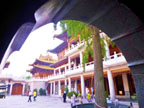 We arrived at the designated room at the Jing An Temple at 10.30 in the morning, bringing fruits, cakes and flowers, tea and wine to offer to our deceased mother. The pictures of two gods were present above the alter; one to calm the floating spirit, the other to guide the way. Seven monks came in shortly to greet us. They were wearing their yellow long gowns and straw sandals. They would perform the rites to help mother with the right passage.
We arrived at the designated room at the Jing An Temple at 10.30 in the morning, bringing fruits, cakes and flowers, tea and wine to offer to our deceased mother. The pictures of two gods were present above the alter; one to calm the floating spirit, the other to guide the way. Seven monks came in shortly to greet us. They were wearing their yellow long gowns and straw sandals. They would perform the rites to help mother with the right passage.
The head monk was about 60 some years old, and he briefed us on what was going to happen for the day. There would be five sessions of worship and chants of 50 minutes each. They would be separated by four 15-minute breaks. The whole event would be completed before 5.30 pm. We would follow his directions to bow and kneel for worship at appropriate times, as the reading of sutras and the chanting proceed to clear the way in the under world. We must be prepared to do so many times to show our filial piety, and to enforce the effectiveness of the rituals and communications.
Three sutras were repeatedly read, in a combination of chorus and tenor solo presentations. The words are non-recognizable by ordinary ears. They were sung 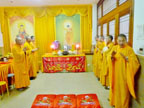 continuously, in tunes of four and five beats, varying in temple and volume. After a while the singing became monotonous. I wondered who it was meant for. Would it be the monks themselves, the gods who guide the passage, the deceased, or we the attendees?
continuously, in tunes of four and five beats, varying in temple and volume. After a while the singing became monotonous. I wondered who it was meant for. Would it be the monks themselves, the gods who guide the passage, the deceased, or we the attendees?
Chinese philosophers believed that the universe was made up of two spheres, the yin and the yang. Everything and all happenings could be identified with one of these spheres. Thus, broadly speaking, our living world is yang in nature, while the underworld is yin. Going through the five sessions, I thought that the rites were for everybody in the two spheres, and the monks were experts in inter-sphere communicators, their chants were languages heard and understood by all.
I know some of the sutras. Their message was quite Daoist, expressing realizations that life is but emptiness, that happiness and eternity could only be reached by detachment, giving up things and feelings with worldly values. The Lotus Sutra 妙法蓮華經 teaches the way to reach insight, urging people (and the dead) to nurture sincerity and do good to others. The Prajna Paramita Heart Sutra 心經 is about playing down sensory desires to reach nirvana. The Diamond Sutra 金剛經 shows the way to the pure land by giving up worldly belongings.
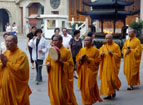 The reading and chanting were accompanied by music, produced by exercising small cymbals, beating small drums and a thick copper gong to produce melodies. Rhythmic beats with a large wooden fish regulated the melodic flow of the chants, presenting colours and enhancing dynamic effects. The ensembles were quite moving to listen to.
The reading and chanting were accompanied by music, produced by exercising small cymbals, beating small drums and a thick copper gong to produce melodies. Rhythmic beats with a large wooden fish regulated the melodic flow of the chants, presenting colours and enhancing dynamic effects. The ensembles were quite moving to listen to.
I observed how my espouse brothers and sisters obeyed the directions of the head monk, doing exactly what he commanded. In fact, they would ask for what to dowhenever the direction stopped, the same way they had been behaving without individual initiatives, but to follow what the government told them what to do before.
A Showcase Then and Now
I asked the head monk what the temple and the monks were doing during the Cultural Revolution, when religious practice was branded renegade.
“The temple was closed to the public. We were doing the same things.”
“What were your daily activities?”
“We read sutras, pray, and learn Marxist and Mao Thoughts”
“Did you not find that to be contradictory?”
“I was young then, just followed orders of our head monk. We were OK if we just do that.”
“I am interested in knowing more about the temple during those years. There must be more than you’ve just said. I would be grateful to know.”
“Well, we were visited by foreign dignitaries now and then, such as Prince Sihanouk of Cambodia. I will not tell names, but two of the Gang of Four, one young and one old, also came in to worship in private. On such occasions, our head monk would make sure that everything was well set up, and we guarded their presence in utmost secrecy.”
“What about the Red Guards? Did they attempt to enter the temple at any time?”
“Not that I know of. We were off limits, protected especially by the Liberation Army.”
“Would you say you were a special showcase then?
“Buddhist belief had always been a part of Chinese life. We attend to the human spirit which is in high order in life, and in need of a peaceful resting place after death. The other famous temples in town, the Yufo Si 玉佛寺 and the Longhua Si 龍華寺 had also survived the rampage of the Red Guards. We often say that ‘The authority of Buddha knows no limits’ 佛法無邊, because it is nested in the human spirit. Showcase or not, we will be here as long as people need us.”
“When was the temple opened to the public again?”
“It is hard to say, because the worshipers preceded the official policy. I think it was around 1980. That was when people began to bury their bad experience of the past. Even our Mayor Chen Yi 陳毅 had his famous poem To Comrades 贈同志appeared in the newspapers. People were quoting the lines:
Nature sees lively clouds float blinding the sun shine
Flower buds thrive in spring to put the severe winter behind
莫道浮雲終蔽日
嚴冬過盡綻春蕾
I thanked him for the information and strolled outside to have a good look at the temple. Everywhere was kept clean and shining even when there were many activities of renovation and expansion. Among the many visitors in the spacious compound were a number of Muslim tourists seen in their traditional attires, cheering and taking photographs on the many terraces and verandas.
Past Fears and Present Gaiety
The day was long. It was also hard work doing literally a hundred bows and kneels. The cost of the services was very reasonable, 6000 RMB in total. The same service in Hong Kong would easily be three times as much. What was most important was that we all felt relieved in believing that our mother is safely on her way to the pure land.
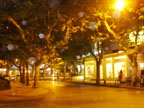 We trooped out to feast again. This time to a restaurant set in the former residence of the Kuomintang security chief Dai Li 戴笠. In days past, the mention of his name would induce fear among communist underground agents. This guarded district was off limits to citizens. Now, the town’s VIP’s flock here, to patronize the romantic atmosphere and fine cuisines found in the many pavilions artistically lid to sooth the heart.
We trooped out to feast again. This time to a restaurant set in the former residence of the Kuomintang security chief Dai Li 戴笠. In days past, the mention of his name would induce fear among communist underground agents. This guarded district was off limits to citizens. Now, the town’s VIP’s flock here, to patronize the romantic atmosphere and fine cuisines found in the many pavilions artistically lid to sooth the heart.
The estate was huge and secluded, bounded by small parks and winding narrow sidewalks. After we had our fills of Hangzhou dishes to our hearts’ content we dispersed to walk around, in small groups. There were shops selling musical instruments. Other shops cater to the foreigner residents in Shanghai, with furniture and curios. It has become a shopping paradise for the young jet-sets inclined to live with beautiful decorations in their houses. Shanghai has once again become a city of diversity.
I took my wife to walk towards the Shanghai Conservatory for nostalgic reasons. We had sponsored a young violinist, Hu Chu 胡初, to study at McGill University in 1983. He is quite talented and is now a teacher at the MenuhinSchool in England. For many years throughout the Cultural Revolution, he had to practise inside a tent built with layers of bed covers so neighbours would not hear him. Anyone could report him to the authorities, so he would be punished as a counter-revolutionary element.
The temperature was cool under a clear moonless sky. The sidewalks were quite empty, except for a strayed dog leisurely sniffling around. We’ve not had such a tranquil easy walk like this for many years. Suddenly my heart jumped. From a room in the Conservatory flew out in the air Ma Vltava, my most favorite Smetana symphonic poems. Of all the music expressing affections toward one’s motherland the Czech composers, like Dvorak, Mahler and Smetana, had the most moving and universally loved melodies. Perhaps the Bohemian life had precipitated in the musicians the urgent need and sweet dreams for home stability.
We stopped to listen. The familiar melodies featuring the murmurs of the VltavaRiver, as it flows through the forts and hills of Prague to become swift currents and towering rapids, evoke far-reaching imaginations.
Was it Tolstoy who said that human life is like a river, meandering, moving through the ups and downs of life strives, searching for home, the final resting place? Was it Pushkin who had expanded the same image of development to a country? Perhaps only poets, writers and musicians could best tell about human needs and feelings.
Perhaps, I thought as I stood at the front door of the Conservatory, China’s future would be brighter and calmer if our musicians could be encouraged to compose music like their Czech counterparts, to depict our beautiful motherland, and to lift our spirits higher to peaceful and freely stable grounds?
As we walked down the slope towards the main thoroughfare, I was reminded that, at the restaurant moments before, five diners in a table next to us were consuming a bottle of Louis XVI cognac costing 6000 RMB, the same amount as what the seven monks at the Jing An were working for, leading people in the yin and the yang spheres to spiritual comfort and serenity.
China dose have a long way to go as she meets herself face to face.


